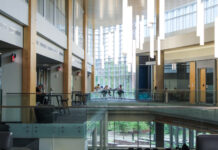UofL and Siemens began working together in 2009 through a performance contract to save energy on the university’s three campuses. Workers have installed more efficient lighting, updated heating and cooling systems and found ways to cut water use in 88 campus buildings with a total area of 6.2 million square feet.
“We’ve saved a lot of money through this initiative and become more energy efficient at the same time,” said UofL President James Ramsey. “After reviewing what we still need to do, we’ve learned we can reap even more savings by extending this project.”
Since the project started, UofL has invested $45.5 million to make its campuses more energy efficient, university officials said.
Belknap Campus improvements that cost $21.7 million in the project’s first phase are guaranteed to save at least $2.3 million in annual energy costs over 13.5 years, while Health Sciences Campus and Belknap boiler system improvements that cost $23.8 million in the project’s second phase are guaranteed to save at least $2 million in annual energy costs over 15 years.
UofL trustees on Feb. 5 authorized spending up to $10 million more for a third phase of the project. Details of the project are not yet final, but officials already have identified $5.4 million in improvements so far expected to lead to another $457,600 in annual cost savings.
The gains will be realized by making additional improvements in lighting, heating and electrical systems, water conservation and other areas.
Cardinal Sports Park, Ekstrom Library, J.B. Speed Building and Strickler, Shumaker and Sackett halls on Belknap Campus will be among buildings receiving improvements, along with the Research Tower and Baxter I, Baxter II and Medical-Dental research buildings at HSC.


























